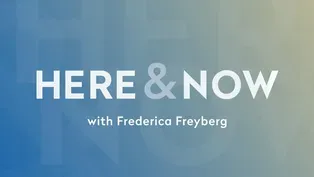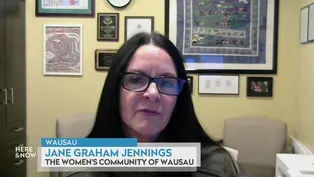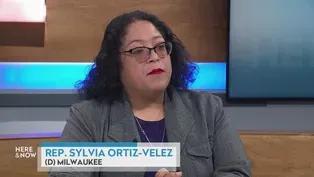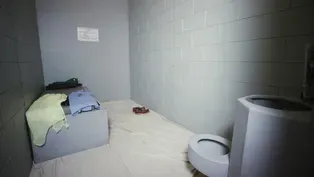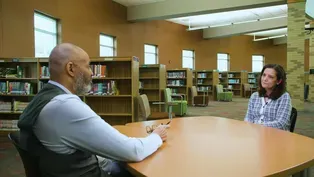Here and Now
Chairman Tehassi Hill on Trump's Orders and Tribal Nations
Clip: Season 2300 Episode 2329 | 5m 32sVideo has Closed Captions
Tehassi Hill on funding for tribal governments and U.S. citizenship of Indigenous people.
Oneida Nation Chairman Tehassi Hill discusses executive orders issued by President Donald Trump to halt federal funding for tribal governments and question the U.S. citizenship of Indigenous people.
Problems with Closed Captions? Closed Captioning Feedback
Problems with Closed Captions? Closed Captioning Feedback
Here and Now is a local public television program presented by PBS Wisconsin
Here and Now
Chairman Tehassi Hill on Trump's Orders and Tribal Nations
Clip: Season 2300 Episode 2329 | 5m 32sVideo has Closed Captions
Oneida Nation Chairman Tehassi Hill discusses executive orders issued by President Donald Trump to halt federal funding for tribal governments and question the U.S. citizenship of Indigenous people.
Problems with Closed Captions? Closed Captioning Feedback
How to Watch Here and Now
Here and Now is available to stream on pbs.org and the free PBS App, available on iPhone, Apple TV, Android TV, Android smartphones, Amazon Fire TV, Amazon Fire Tablet, Roku, Samsung Smart TV, and Vizio.
Providing Support for PBS.org
Learn Moreabout PBS online sponsorshipwork you do.
>> Thank you.
>> The 11 tribal nations in Wisconsin have dozens of federal grant programs, including nearly $3 billion for tribal health, 14 million for broadband, and more than 10 million connected to tribal colleges.
Just how vulnerable is this funding, and how might treaty rights be violated?
Violated?
Not to mention the services provided if it gets wiped away.
We turn to Darcy Hill, chairman of the Oneida Nation, for his take.
And chairman, thanks very much for being here.
>> Yes, thank you for the invitation.
be potential impacts of any federal funding freeze?
>> Yeah, it could be.
It could be quite large, depending on how they're rolled out.
And the particulars.
So at Oneida, a very large portion of our budget actually comes from federal and state grants.
So if it's just wiped clear, that would be very detrimental to our community.
And for employment levels and for families and all that.
We take care of here in Oneida.
>> When you got word that there was this pause or freeze on these grant and loan programs, what was your reaction?
>> Well, you know, at first it was well, it's let's hope it's not as bad as it's being made out to be.
Obviously, as it comes to tribal nations and how we're affected by the federal dollar and government shutdowns and.
Freezes like this is a little bit different per se, just depending on what those lines that are frozen and how they impact to the nation.
And so, you know, it's definitely okay, let's let's see what happens with this, how these different departments are handling this presidential order and see what exactly those effects are on, on us.
>> What about the piece that are binding commitments and sovereign tribal nations based on treaty and trust obligations from land exchange?
Hundreds of years ago?
>> Yeah, that's always the worry.
You know, obviously tribal nations have ceded, you know, upwards of 2 billion acres of land to the birth of the United States.
And in exchange for that land was, you know, promises that we battle every day to hold the United States accountable to the promises they made to our ancestors.
For that transaction.
And so that's a that's an everyday battle, no matter who the president is or who's in Congress.
Tribes stand up together to fight, fight those battles and do that education where necessary to be able to bring to light those issues when it comes to funding for tribal nations.
>> Does does this move seem somehow different or setting an alarming precedent in your mind?
>> I think it is alarming to a certain extent.
Just because a lot of the presidential orders are pretty broad and so they're not specific enough for us to be able to analyze and be like, okay, this is how it's going to affect us, because a lot of it is just left up to the discretion of either political appointees or long term employees who don't necessarily have the authority to make the decisions that they normally would.
During these transition periods.
So it's really, you know, kind of like a wait and see at this point how those decisions are made and they trickle down through the system to have the effect on tribal nations.
>> As to executive orders coming out of Washington, we've seen reported that some tribal members have been detained and immigration sweeps.
Is that something that you're aware of in the Oneida or across the state?
>> I haven't have no been able to verify any Oneida tribal members being detained or even checked at this point.
I know another tribe in the state that they had some of their tribal members checked, but not detained, just verifying their identification and let you know, continue on their way to where they were heading.
But for us, we haven't had any verified accounts of anyone actually being detained.
>> Is it perversely in question that all Native Americans born in the U.S. Are citizens?
As to this birthright citizen issue?
>> Yeah.
You know, the Snyder Act passed in 1924, so it's 100 year old law.
And so I don't think that's really in question.
It would obviously take an act of Congress to reverse that decision, or the Supreme Court to change these types of things.
And so those are kind of long processes that would probably see legal battle and the entire way, you know, along the way, it's processed to the Supreme Court.
And so I think that's just a long standing law that I don't think is in any question right now.
But it is in the backs of some people's minds as a threat to tribal sovereignty.
But I think at this point, it's a long ways off.
>> That's good news.
Chairman Tehassi Hill, thanks very much.
Here & Now opening for January 31, 2025
Video has Closed Captions
The introduction to the January 31, 2025 episode of Here & Now. (59s)
Jane Graham Jennings on Impacts of Freezes on Federal Grants
Video has Closed Captions
Jane Graham Jennings on effects of potential freezes on federal grants on social services. (5m 23s)
Rep. Sylvia Ortiz-Velez on State Policy Addressing ICE raids
Video has Closed Captions
Sylvia Ortiz-Velez on a bill to limit immigration detention and raids in Wisconsin. (8m 42s)
A Mobile Prison Cell Exposes Solitary Confinement Conditions
Video has Closed Captions
An activist built a model cell to illustrate conditions of solitary confinement. (8m 8s)
In Focus with Saghar Homayounpour: 2024 Teacher of the Year
Video has Closed Captions
Murv Seymour talks with Saghar Homayounpour about passion for teaching computer science. (30m 57s)
Providing Support for PBS.org
Learn Moreabout PBS online sponsorshipHere and Now is a local public television program presented by PBS Wisconsin
